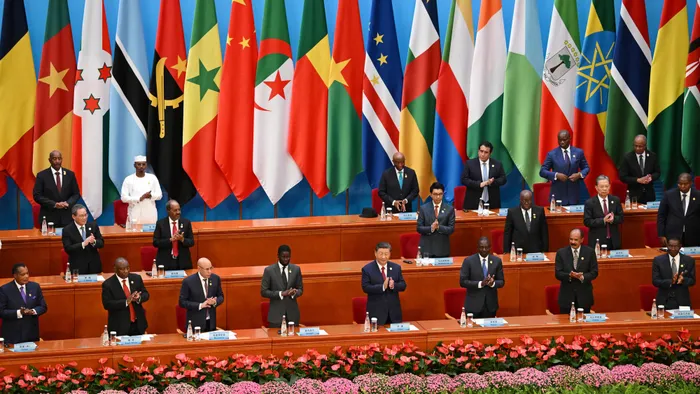Economic diplomacy at the centre of renewed China, Africa relations

African leaders applaud Chinese President Xi Jinping, centre, after his speech at the opening ceremony of the Forum on China-Africa Cooperation (FOCAC) in Beijing’s Great Hall of the People on September 5, 2024. President Xi Jinping has enjoined China and African countries to pursue a modernisation process that was just and equitable and to act in accordance with national circumstances, as opposed to a Western modernisation process that has brought suffering and misery to developing countries. – Picture: Greg Baker / AFP
By Sizo Nkala
China and Africa held the triennial Forum on China-Africa Cooperation Summit in Beijing from September 4 to 6. In the past 24 years, Focac has become a platform where the two sides formulate the agenda of their relationship for the next three years.
As expected, the 2024 Focac gathering was highly subscribed, with dozens of heads of state and delegations from 53 African countries, including the UN and AU being represented.
In his keynote address on Thursday, Chinese President Xi Jinping described China and Africa’s relationship as being at its “best in history” and pledged to elevate the relationship to an “all-weather China-Africa community with a shared future for the new era”. The idea was first proposed at the 2018 summit.
While criticising the Western modernisation process for bringing suffering and misery to developing countries, Xi enjoined China and African countries to pursue a modernisation process that was just and equitable and to act in accordance with national circumstances.
He said China would co-operate with Africa in trade, infrastructure, agriculture, industry, investment and high-quality Belt and Road Initiative (BRI) projects that would symbolise the China-proposed Global Development Initiative.
People-centredness, promotion of inclusiveness and diversity, eco-friendliness and peace and security were some of the values of the Sino-African modernisation project, Xi said. He committed to working with African leaders to push for green development and improving Africa’s capacity to tackle security problems under the auspices of the Global Security Initiative.
In the next three years, China and Africa will form action partnerships in 10 key areas: mutual learning among civilisations, trade prosperity, industrial chain co-operation, infrastructure connectivity, development, health, agricultural development, people-to-people exchanges, green development and security.
The major projects to be implemented under the partnerships include the establishment of 25 centres on China and Africa studies, which will promote the production of research and knowledge to inform co-operation programmes and policies between the two sides.
Trade has been a dominant theme in China-Africa relations. In the next three years, China will give zero tariff treatment to 33 least developed countries in Africa and also expand market access for Africa’s agricultural products. In a bid to help develop Africa’s industrial capacity, China committed to launching the African SMEs empowerment programme.
In addition, a digital technology co-operation centre will oversee 20 digital demonstration projects aimed at incorporating the new technologies into Africa’s economy. China is one of the world’s digital superpowers and is well-placed to assist Africa in its digital transformation. Interestingly, China will undertake 30 infrastructure connectivity projects under the high-quality BRI co-operation scheme. This will see the building of roads, rails, ports, power plants and communication infrastructure across the continent.
If successfully executed, the projects will be a key step towards making the African Continental Free Trade Area which relies on functional infrastructure, a reality. In agriculture, more than 6,000 hectares of land will be dedicated to agricultural demonstration led by 500 agricultural experts from China to help address food insecurity, which has been affecting African countries for a long time.
The continent has 65% of the world’s uncultivated arable land, which is due to lack of capacity. One hopes that the interventions by China will lead to increased use of arable land which would mean increased exports for the Continent.
Other projects to be undertaken include 60,000 training opportunities for African citizens, targeting women and youth; 30 clean energy projects; and the training of 6 000 military personnel and 1,000 policeman. The 60,000 training opportunities, taken together with the decision to declare 2026 the Year of China-Africa People-to-People Exchanges, signals China’s commitment to boosting its soft power and influence in Africa.
Economic diplomacy seems set to regain its pride of place in China’s approach to Africa.
The Chinese leader announced $50.7 billion (R900bn) would be availed to fund the projects. A huge chunk of that, almost $30bn would be availed through credit lines, $10bn would be through investment by Chinese companies in Africa and $11bn would be availed through various forms of assistance.
This is a huge increase from the $30bn package that was announced in the 2021 gathering in Dakar, Senegal. It puts paid to the widely shared view that big financial commitments in Focac were a thing of the past. China has used the 2024 Focac summit to signal its continued commitment to the continent which, with its block of 54 countries, has become an increasingly significant geopolitical actor. In its geopolitical tug of war with the West, China needs to keep Africa’s diplomatic support to shore up its global influence and power.
Hence, the next few years will probably see an increase in Chinese loan commitments to Africa which had decreased significantly since 2016. The amount of Chinese loans to Africa decreased from $28bn in 2016 to less than $1bn in 2022. African countries, most of whom are facing a credit crunch, will welcome the new funding announcement.
* Dr Sizo Nkala is a research fellow at the University of Johannesburg’s Centre for Africa-China Studies.
** The views expressed in this article do not necessarily reflect the views of The African
Related Topics: